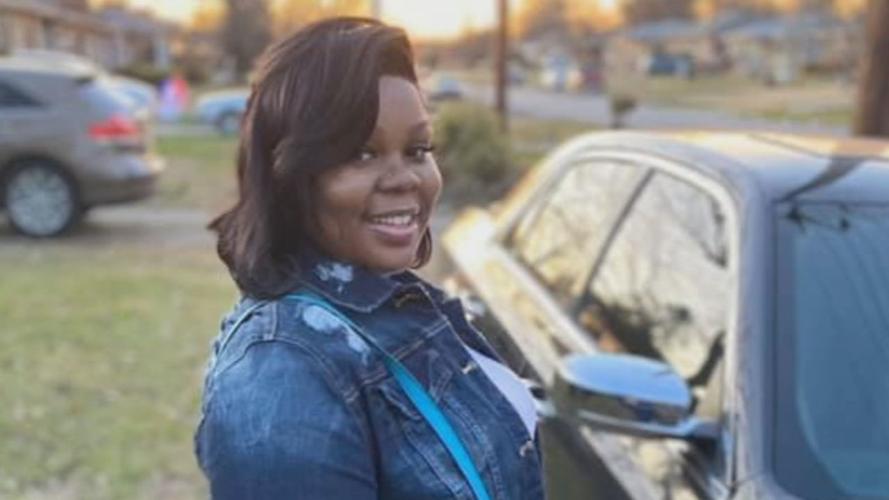LOUISVILLE, Ky. (WDRB) — A Kentucky task force on search warrants established in the wake of the fatal Breonna Taylor police shooting is recommending additional training for officers, an electronic database and tracking zip codes where search warrants are executed.
Kentucky Attorney General Daniel Cameron promised the creation of the task force last year, after his office completed a review of Taylor's March 13, 2020, fatal shooting. Police used a narcotics warrant to enter Taylor's apartment shortly before the 26-year-old medical technician was shot to death by officers.
Cameron said the goal of the task force was "to conduct a top to bottom review of the search warrant process" in Kentucky. He announced in a news release Tuesday that the 18-member panel had completed its work and issued several recommendations.
“The final recommendations reflect law enforcement’s role in advancing public safety and acknowledge the personal protections guaranteed by our Constitution,” Cameron said.
Cameron, a Republican, was the special prosecutor who investigated the police actions on the night of Taylor’s death. That investigation culminated in a grand jury ruling that did not charge any of the officers in her death. The “no knock” warrant used at Taylor’s home and how it was obtained was not part of Cameron’s investigation, but a federal probe of that process is ongoing.
The task force recommended all state and local agencies use an electronic platform maintained by the state Administrative Office of the Courts to record the use of search warrants and that agencies track the locations where search warrants are used.
“The format should allow the public to compare the number of search warrants served across various zip codes and regions of the Commonwealth,” Cameron's release said.
The lawyer for Breonna Taylor, Lonita Baker, said she found it concerning the Department of Public Advocacy's recommendations were not included in the final report, considering it is the agency that represents those impacted by search warrants.
"I didn't see any real changes in the way warrants are executed, there is nothing to prevent the kind of police conduct that lead to the murder of Breonna Taylor," Baker said.
It also recommended having prosecutors review and approve search warrants; increased search warrant training for officers; and considering the time of day the warrants are used and whether children might be present.
The task force consisted of state lawmakers, representatives appointed by the Chief Justice of Kentucky’s Supreme Court, police members, citizens and a member of the Kentucky NAACP.
While the variety is noted in a list, Damon Preston with the Department of Public Advocacy said the task force was still heavy with law enforcement, rather than more voices from people who have had a search warrant executed on them.
Another member of panel, former Louisville councilmember Denise Bentley, said it was a difficult task force because it had to take a statewide approach, it wasn't solely looking at Louisville police reform.
"I wasn't 100 percent happy, but I don't think anyone in the room was and that's just part of compromise and working with people's people from different walks of life," she said.
She added the steps recommended don't go as far as she'd like either, but it's a step.
"I know it's no consolation to [Breonna Taylor's] family, I'm hopeful through this process we can get a lot closer to making sure that there are protocols in place and regulations in place so this never ever happens again in the Commonwealth of Kentucky," Bentley said.
Organizers Cara Tobe and Rachel Hardy with The 490 Project, a group pushing for LMPD accountability, said the report is merely words on paper.
"These are really common sense recommendations. It's insane that they're even having to be recommended in the first place," Tobe said.
The group also criticized Attorney General Daniel Cameron's involvement, saying his office has the power to do more.
"It's a waste of time and money, and resources for our state to be focusing on something that has no teeth and was not designed to have teeth," Hardy said.
Preston with the Department of Public Advocacy echoed that sentiment, these recommendations stem from a discussion with no mandatory changes.
There were also state lawmakers in the task force and they could write bills to try and make a lasting change out of the report.
Taylor was killed by officers who fired 32 rounds into her home after Taylor’s boyfriend fired a shot at them. Taylor’s boyfriend said he thought an intruder was breaking in. No drugs were found in her home.
The “no-knock” warrant used to enter Taylor’s home was obtained by a police detective who later acknowledged he did not confirm with postal officials whether a whether a suspected drug dealer was having packages sent to Taylor’s home. The no-knock warrants, which allow officers to burst into a home without announcing, have since been banned by Louisville’s Metro Council in a law named for Taylor.
Copyright 2021 WDRB Media. The Associated Press contributed to this story. All Rights Reserved.















